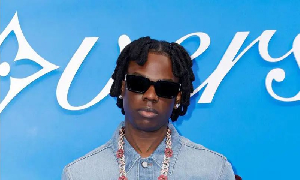A wreath laying ceremony was held on Monday at the Revolutionary Square in Accra to climax activities for the commemoration of the 33rd Anniversary of the June Four Uprising.
The celebration had the theme: "Integrity for Sustainable Development."
The Cadres of the June Four Revolution, dressed in white shirts and black trousers with black berets, demonstrated their military foot works in an exciting parade at the square.
Amidst drumming and dancing by Ghana Dance Company, Flight Lieutenant Jerry John Rawlings, a Former Leader of the Revolution, arrived together with his wife, Nana Konadu Agyeman Rawlings at exactly 0830 hours to the loud cheers from the crowd.
The general salute was then observed, after which Numo Agbesi, Osu Wolumo offered Traditional prayers, Alhaji Mohammed, Muslim prayers and Reverend Asare Obeng Christian prayers.
This was followed by the blowing of the flute (Atentenben/Osabarima) by the Ghana Dance Company, after which four wreaths were laid for the fallen heroes on behalf of Ghanaians, the Security Services, the Cadet Corps and traditional rulers.
The wreaths were laid by Ms Sylvia Akoyuo, General Secretary of the 31st December Women's Movement; Dr Ayirebi-Acquah, former Minister of Defence; Ms Rejoice Ahiable, a Cadre and National Treasurer of the United Cadre Corps, and Nii Sackey II, Otublohum Mantse.
Afterwards, the last post was sounded, which was followed by a minute's silence to honour the fallen heroes of the uprising.
There was also a mock reveille.
The lighting of the perpetual flame to climax the ceremony, which is usually performed by Former President Rawlings with spectacular action was this time round performed with some hesitation amidst appeals by the crowd.
Characteristically, the former President walked across the red carpet with calculated steps, took hold of the torch to light the perpetual flame as expected but to the surprise of all, he refused to light it up.
He handed the torch over to a Cadre, walked across to the podium to explain his action saying: "I have difficulties lighting the flame this time round.
“We cannot continue to let the perpetual flame remain an illusion. It must represent integrity, dedication, honesty and empowerment of the people. It is only when these values are upheld that I can understand the need to light the flame.”
After taking this position for a while, Former President Rawlings again took the microphone once more and said: "There are colleagues here who feel the flame provides some form of hope. I have listened to their advice and I would get back there to ignite it."
This was received with cheers from the crowd and as he went back to light the flame he received thunderous cheers.
In an earlier speech, Former President Rawlings paid tribute to those who contributed to the success of the uprising, saying: "I acknowledge the presence of some unknown but energetic soldiers who contributed to the success of the revolt.”
He said, “Contrary to the assertion by some that democracy began in Ghana in 1992, Democracy actually begun on 31st December, 1981. It was constitutional rule that begun in 1992."
Naval Captain Asase-Gyimah a June Four cadre, said in an address, "I entreat believers in June Four to note that the Uprising brought us together and should keep us together.
“There is no other way. Let's settle our differences with truth and stand by each other."
On June 4, 1979, Junior Ranks within the Ghana Army, broke into the cell of Flt. Lt. Jerry John Rawlings and rescued him from prison following a failed attempt to overthrow the then military government, the Supreme Military Council Two, headed by Lt. General Frederick Akuffo, on May 15.
After a successful take-over by Flt. Lt. Rawlings of the uprising, the Armed Forces Revolutionary Council was formed with him as the Chairman.
The AFRC handed over power to a civilian elected government headed by Dr Hilla Limann after three months in power.
Flt Lt Rawlings, however, returned to power on December 31, 1981 in a coup, leading to the overthrow of the Dr Limann’s Government and the setting up of the Provisional National Defence Council, of which he was chairman until Ghana returned to constitutional elections once more in 1992.**
Politics of Monday, 4 June 2012
Source: GNA
Wreath laying ceremony held to commemorate June 4th
Entertainment












